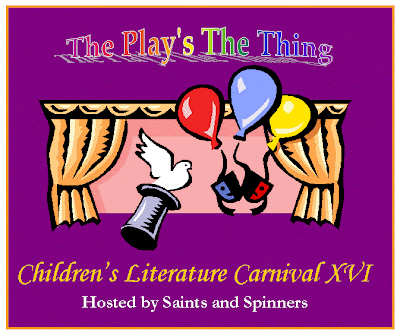 I was 6 years old when I first heard Tikki Tikki Tembo by Arlene Mosel read aloud by my school librarian. The whole class loved it, and we practiced saying the main character's name: "Tikki tikki tembo-no sa rembo-chari bari ruchi-pip peri pembo." The name allegedly meant in Chinese "the most wonderful child in the world." Tikki Tikki Tembo's younger brother, Chang, had a name that meant "little or nothing." The length of Tikki Tikki Tembo's name posed a problem when the character fell into the well. The illustrations by Blair Lent are lovely and the story is top-notch. However, Mosel's story perpetuates a number of Asian stereotypes, mainly the idea that syllables from Asiatic languages are nonsensical and that the elder son is more valued than the younger son. Like Little Black Sambo and The Five Chinese Brothers, the bare-bones of the story itself is compelling but the stereotypes are offensive. (As a side note, some discussion boards point out that Tikki Tikki Tembo is actually based on an old Japanese folktale.)
I was 6 years old when I first heard Tikki Tikki Tembo by Arlene Mosel read aloud by my school librarian. The whole class loved it, and we practiced saying the main character's name: "Tikki tikki tembo-no sa rembo-chari bari ruchi-pip peri pembo." The name allegedly meant in Chinese "the most wonderful child in the world." Tikki Tikki Tembo's younger brother, Chang, had a name that meant "little or nothing." The length of Tikki Tikki Tembo's name posed a problem when the character fell into the well. The illustrations by Blair Lent are lovely and the story is top-notch. However, Mosel's story perpetuates a number of Asian stereotypes, mainly the idea that syllables from Asiatic languages are nonsensical and that the elder son is more valued than the younger son. Like Little Black Sambo and The Five Chinese Brothers, the bare-bones of the story itself is compelling but the stereotypes are offensive. (As a side note, some discussion boards point out that Tikki Tikki Tembo is actually based on an old Japanese folktale.)Before you start to protest,"Oh, stop being so politically correct already!" and "If we get rid of every book that has racism/sexism in it, we'll have nothing left on the bookshelves," be assured that I'm not proposing we get rid of any story. However, we should think really, really hard about the books we read (especially to children) and how the stories affect all of us. At the very least, think about what it would be like to be a Chinese child listening to Tikki Tikki Tembo read aloud in a classroom.
I read about a librarian who used Tikki Tikki Tembo in her storytimes, but instead of the setting taking place in "long ago China," she had the story set on Mars, whereby the Martians all give their children long names. I haven't used Tikki Tikki Tembo in storytimes, but when the time comes where my daughter discovers the story, I'm going to use a similar approach. Still, if the main goal is for children to have a long, amusing name to recite aloud, there are alternatives:
1) Catalina Magdalena Hoopensteiner Wallendiner Hogan Logan Bogan Was Her Name, by Tedd Arnold
I don't care for the illustrations, but the song is great! I can post the chords and a link to the song for a future Song of the Week, if you like.
2) The camp song Eddie Cucha Catcha Camma Toesanara Toesanocka Samma Camma Wacky Brown.
Unlike the protagonist of Tikki Tikki Tembo, the subject of the story does come to a bad end.
In the past, I've deliberately avoided controversial topics. I've wanted to entertain you, after all. Still, I do think about these issues frequently, and want to talk about them with people who also want to talk about them. I've long ago stopped trying to please everyone (it's impossible), but I do have an obligation to present stories that provide fair, non-stereotypical depictions of the people they represent. I have no room in which to say, "Oh, it's just a story."
Do I take stories too seriously? You bet I do! And I'm not about to stop.
Thanks to TadMack for starting this discussion in another forum.
















































